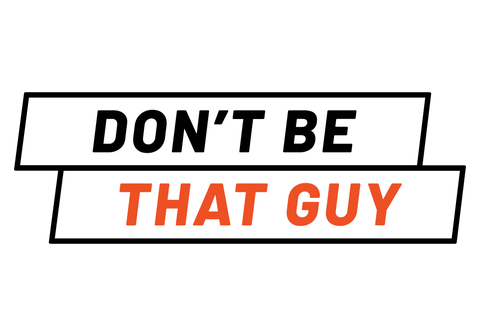


Eric Rosati/Men's Health
Welcome to Don’t Be That Guy, our weekly column where we answer all of your most pressing, weirdly specific questions about what type of behavior is — and isn’t — OK at the gym.
As a manager of Orlando gym Power Strength Gym, Valerii Kutiepov has seen it all — or, perhaps more accurately, she’s heard it all. She’s heard trainers yelling at clients, the sound of weights crashing to the floor, people screeching as they lift. She’s even heard people singing during their workout. But there’s one sound that annoys gym-goers above all others: grunting.
Loud grunting at the gym is one of the most common gripes in fitness culture. It gets under people’s skin in a way that few other gym etiquette breaches can, to the point where, in 2006, a New York bodybuilder was forced to leave a Planet Fitness after being accused of grunting too loudly. (The same gym also has a controversial “Lunk Alarm,” a siren triggered in part by vociferous grunting.) An overly vociferous deadlifter was even physically attacked at the Montreal-based gym BuzzFit earlier this year.
Over the years, voices on both sides of the loud lifter argument weighed in: while many bodybuilders on Twitter bemoan overly grunty bodybuilders, others defend gym grunters, arguing that grunting is a sign of commitment to your physical fitness and can actually enhance your workout. It’s become something of a polarizing debate: to grunt or not to grunt?
Matrixx Ferreira, certified exercise physiologist and owner of Iron Performance Center in Ontario, sings the praises of excess noise during a workout. In fact, he says grunting is a sign that you’re truly exerting yourself during a workout. “To get maximal results or see adaptation, we need to give maximal effort,” Ferreira says. “The most efficient way to do that is technique and part of that technique is breathing and how you exhale. This is definitely one of the small details that’s often overlooked.”
As it turns out, there’s science to support that. In 2014, researchers at Drexel University Health Sciences Program analyzed the strength with which study participants squeezed a handgrip, with and without vocalization. The researchers found that participants used 10 percent more force when they were yelling while squeezing. Similarly, in a 2014 study of tennis players, researchers found that when the athletes grunted during serves and forehand strokes, their velocity, force, and peak muscle activity increased. A new study in PLOS One also found that martial artists kicked harder when they grunted than when they didn’t.
“The whole theory behind all of this is when we’re trying to do something forceful, we typically take a deep breath in and then we hold it and exhale at some point as we get through the movement,” says Dennis O’Connell, PT, PhD, DPT, CSCS, FACSM, professor of physical therapy at Hardin-Simmons University, and the lead researcher on the grunting tennis player study. When you’re working with weights, he explains, there’s one of two outcomes when you release air at the heaviest part of your lift: “A grunt or a screech that someone might find bothersome, or a forced exhalation.”
“People who notice this have too much time on their hands. Concentrate on your workout and do your thing.”
In his work, O’Connell also looked at the volume of these grunts versus a loud exhale. Interestingly, in most cases the grunt was only a few decibels louder, even though it was only the grunt that seemed to annoy people.
For his part, Ferreira encourages all of his clients to let out a little grunt or sigh while lifting. At his gym, he says, no one is shamed for being a “lunk” or a “meathead” if they’re a little loud when they lift. But if you belong to a gym that’s a little less understanding, survey the environment before you let out a few screams, he says. Ask yourself: Is it relatively quiet? Is the gym a strength performance center? And if someone politely comments that your grunts are throwing off their game, move to a different area and be respectful of their space.
That said, Kutiepov believes it’s time to free the grunt. Just as kids have the privilege of running around screaming on the playground, she says, grownups should be entitled to the same release when it comes to the gym. “When you’re grunting it makes you feel like you’re this powerful thing,” she says. “This almost animalistic instinct comes out because you need to survive this rep. If it makes them feel better, I’m all for this.”
So long as you’re respectful of the facility and other gym-goers, you do you, she says. “Maybe it’s just me because I live in this industry and I’ve done this for so long, [but] people who notice this, they have too much time on their hands,” Kutiepov says. “Concentrate on your workout and do your thing.”
Source: Read Full Article